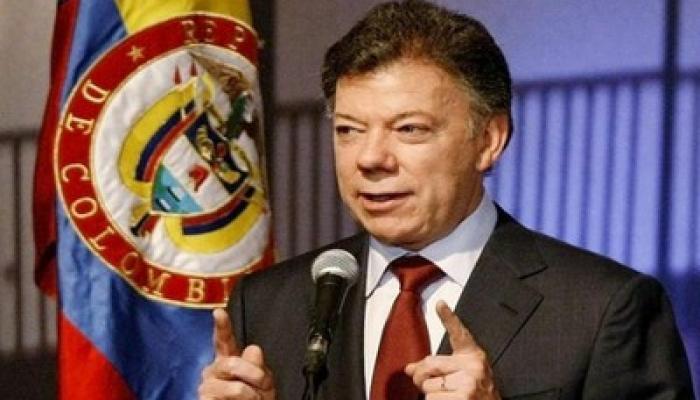London, November 3 (RHC)-- As the peace deal between the Colombian government and the country’s largest guerrilla army, the FARC, remains in limbo after an extremely narrow defeat at the ballot box, President Juan Manuel Santos hinted Wednesday that the revised agreement will not be ratified by popular vote, but sent straight to Congress.
Speaking from the British parliament during a state visit to the United Kingdom exactly one month after the October 2nd plebiscite that voted down the historic peace accords by less than half a percentage point, Santos said that Congress will implement the deal, implying that it would skip over the step of a popular vote.
“We have managed to advance and in the very near future we will have an agreement,” said Santos. “I will have the power to implement it through Congress.”
Colombian Senate President Mauricio Lizcano, accompanying Santos on his U.K. visit, confirmed that the plan of not having a second plebiscite has already been under discussion, and celebrated the president’s “wise decision.”
“That’s what we proposed two weeks ago in Bogota,” he said, according to Colombia’s El Espectador. “Congress keeps its faculties in tact and if it decides to implement the agreements then it would be endorsing it... and Congress is willing to assume that responsibility.”
Lizcano added that holding another plebiscite would be draining and “would take more time that is needed to implement the agreements.”
The October 2nd plebiscite was aimed at ratifying the peace deal -- finalized after nearly four years of talks between the government and the FARC in Havana -- with Colombian society, but in a shocking result the “No” camp eked out a win by a razor-thin margin. The upset result hurled Colombia’s burgeoning peace into uncertainty, as the legal consequences of the vote -- binding on the president but not the Congress -- had been ambiguous.
Since the blow to the much-anticipated end to over 50 years of armed conflict, FARC and government delegations have returned to the negotiating table in Havana. Both sides have also held consultations with diverse sectors of society -- including victims and movements for peace, as well as representatives of the “No” camp, led by former far-right president and current Senator Alvaro Uribe -- to discuss proposed revisions of the peace deal.
Uribe has been vehemently opposed to foundational aspects of the agreement, namely the transitional justice mechanisms that offer reduced sentences for those who voluntarily own up to their crimes in the name of truth and the guaranteed seats in Congress for two election cycles for the soon-to-be-formed FARC political party. The deal’s “gender focus” promoting the rights of the LGBTI community and women, considered one of the groups most victimized by the conflict, has also sparked backlash from conservative religious groups.
The kind of overhaul to the agreement demanded by Uribe has been largely deemed untenable, as his proposals call for the 7,000 rebel-strong FARC accepting much harsher conditions. Uribe argues that Santos has been too lenient with the 52-year-old guerrilla force and awarded its war against the government with impunity. Victims of the conflict, however, overwhelmingly supported the peace deal in the plebiscite, and support measures to prioritize ending the war and uncovering truth over criminal prosecutions for demobilized rebels.
Meanwhile, the other branch of Colombia’s peace process, talks with the second largest guerrilla army, the ELN, was also dealt a blow last week when Santos called off the launch of negotiations over a dispute about the release of a key hostage.
Colombia’s more than half century-long civil war has claimed some 260,000 lives and uprooted nearly seven million people.
Colombian President Juan Manuel Santos Says No Second Vote on Revised Peace Deal

Articles en relation
Commentaires
Laissez un commentaire
Tous les champs sont requis
En reproduction maintenant
El Caribe que nos une
Au suivant
- Desde Mi Habana
- Cartas a la Redacción
- Cancionero Iberoamericano
Plus de visites
- Lula rejette le blocus de Cuba au sommet de la Celac et met en garde contre l'ingérence
- La levée du blocus américain contre Cuba est demandée en France
- Le gouvernement guatémaltèque est appelé à rejeter les positions extrêmes interventionnistes des États-Unis à l'égard de Cuba
- L'ambassadeur de Cuba au Venezuela remercie la solidarité internationale avec les missions médicales (+Photo)
- Le président Díaz-Canel rentre à Cuba après avoir participé au sommet de la CELAC au Honduras (+Photo)

